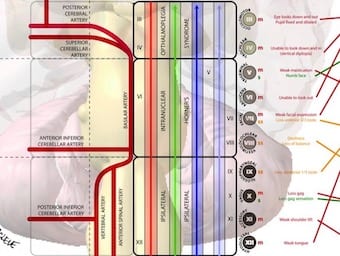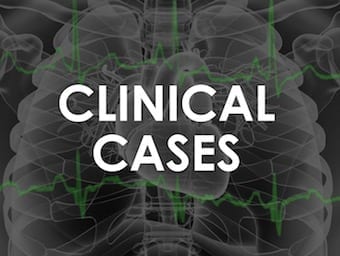
The rule of 4 of the brainstem
Peter Gates rule of 4 of the brainstem illustrated in a single diagram...why and how?

Peter Gates rule of 4 of the brainstem illustrated in a single diagram...why and how?

Gates described a simplified method for answering the question 'Where is the lesion?' using only the parts of the brainstem that we actually examine during a clinical examination to understand brainstem vascular syndromes.

When you travel from Perth in Western Australia to San Francisco you are in for a long day...a forty hour day in fact, thanks to the arbitrary placement of the international dateline. I am here to meet emergency medicine edumactor extraordinaire Mel Herbert at the USC Essentials of Emergency Medicine extravaganza...

David Bayford (1739-1790) was an English surgeon and physician. Biography Medical Eponyms Bayford-Autenrieth dysphagia [aka Dysphagia lusoria] (1787; 1807) Dysphagia secondary to an aberrant right subclavian artery (ARSA) In February I76I, Bayford was present for an autopsy where an emaciated woman…

Peyronie disease refers to plaques (flat scar tissue) forming under the skin of the penis. The plaques can be palpated through the skin; are often painful; and can cause the penis to bend, shorten or become indented during erections.

Charles Clifford Macklin (1883-1959) was a Canadian pulmonologist. Macklin Effect (1939)

Sir James Paget (1814 - 1899) was a renowned English surgeon. In a career spanning eight decades, with research and practice in surgery, as well as serving the royal family during Queen Victoria’s reign

Issue 2 (Vol. 27) of Emergency Medicine Australasia (EMA Journal) for 2015 published online 25 March. Editorial overview Andrew Gosbell & Geoff Hughes
Ferdinand-Jean Darier (1856-1938) was a Hungarian born, French dermatologist and physician. Affiliated with Darrier sign and Darier disease

It's Friday. Boggle your brain with FFFF challenge and some old fashioned trivia. Funtabulously Frivolous Friday Five 272

An ECG case of Bidirectional ventricular tachycardia focusing on two main causes: digoxin toxicity & catecholaminergic polymorphic VT - CPVT

Alistair Nichol explains why the "favourability" of outcomes from brain trauma in the RESCUEicp trial are in the eye of the beholder.